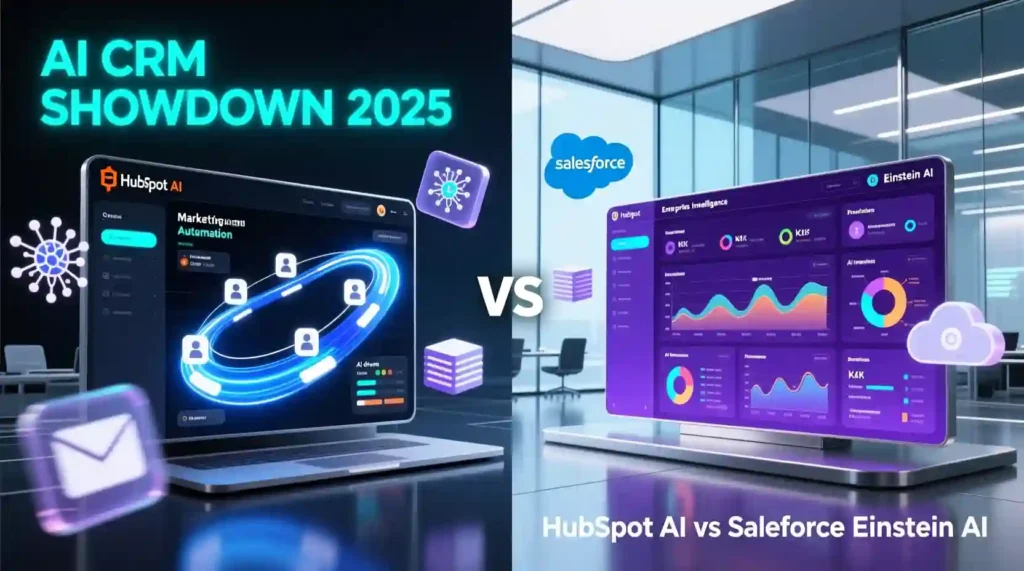
HubSpot vs Salesforce AI: Which CRM AI Reigns Supreme?
Introduction
In the battle of HubSpot vs Salesforce AI, choosing the right CRM can feel like navigating a jungle. When I first dipped my toes into the CRM world, I saw teams either praising HubSpot for its simplicity and AI-powered marketing ease—or swearing by Salesforce Einstein AI as the “untouchable giant” of enterprise-grade intelligence.
Fast forward a few years and both players now have AI at their core. HubSpot weaves it into marketing and sales flows so it feels natural, while Salesforce went all-in with Einstein AI, promising predictive insights at enterprise scale.
So why does this showdown even matter? Because the CRM market is exploding. Businesses of all sizes are racing to integrate AI into their sales pipelines, marketing funnels, and customer support. The problem? Overlap. Small teams want the power of AI without complexity. Enterprises want flexibility without sacrificing speed. And everyone’s asking the same question: Which CRM AI is really worth it?
By the time you finish this guide, you’ll walk away with:
- A deep dive into both tools’ origins, goals, and strengths
- Feature-by-feature breakdowns that show where each shines
- Insights into ease of use, integrations, and performance
- Real anecdotes about how these tools feel in everyday workflows
- A verdict that makes it clear whether HubSpot AI or Salesforce AI is right for you
Let’s get into it.
Tool Overviews
HubSpot AI at a Glance
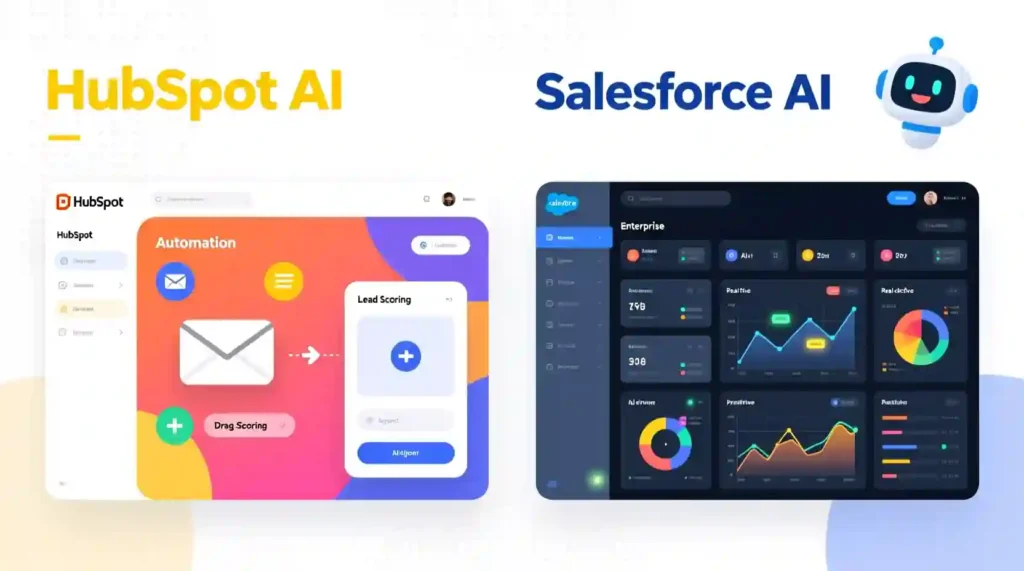
HubSpot’s story feels like a startup dream. Founded in 2006 in Cambridge, Massachusetts, it started as an inbound marketing platform that helped small businesses attract leads without burning a hole in their pocket. Over time, it expanded into CRM, sales automation, and customer support.
The AI part? HubSpot began layering AI into workflows to make marketing smarter and less manual. Think: AI-driven lead scoring, automatic content generation for email campaigns, and predictive sales insights.
If I had to sum up HubSpot AI in three words: ease, integration, and speed. The beauty of it is that it doesn’t feel like you’re learning a new AI tool. Instead, it feels like your CRM just “got smarter overnight.”
Unique selling points:
- Dead simple to use (even if you hate tech).
- Seamlessly connects marketing, sales, and support under one roof.
- AI features built to save time instead of overwhelm.
When I first tried it for a startup client, the onboarding felt like setting up a Gmail account compared to the beast that Salesforce can be. Within an afternoon, we had email campaigns running, leads tracked, and AI nudges showing which contacts were “warm.” It felt almost too easy.
Salesforce AI in Focus
Salesforce’s story is different — big, bold, and enterprise from the start. Marc Benioff, a former Oracle exec, founded it back in 1999 with a radical vision: CRM delivered via the cloud. That move alone changed the software world.
When AI entered the scene, Salesforce launched Einstein AI in 2016. Unlike HubSpot’s lightweight AI, Einstein is a full-blown predictive analytics and automation engine. It powers everything from sales forecasting and opportunity scoring to customer service chatbots and personalized marketing journeys.
If I had to sum up Salesforce AI: customization, power, and ecosystem.
What sets it apart:
- Insanely customizable (you can bend it to fit almost any business model).
- Built for enterprises that run on data.
- Ecosystem of integrations and apps that feels limitless.
When I first worked with Salesforce, I’ll be honest — it felt intimidating. The dashboard had more tabs than my brain could handle. But after a few months in, the predictive AI blew me away. For one client, Einstein flagged a “low-probability deal” as a likely win based on historic patterns. We followed the lead and landed a six-figure contract. That’s when I realized: this isn’t just a CRM; it’s a sales brain with superpowers.
HubSpot vs Salesforce AI Feature-by-Feature Comparison
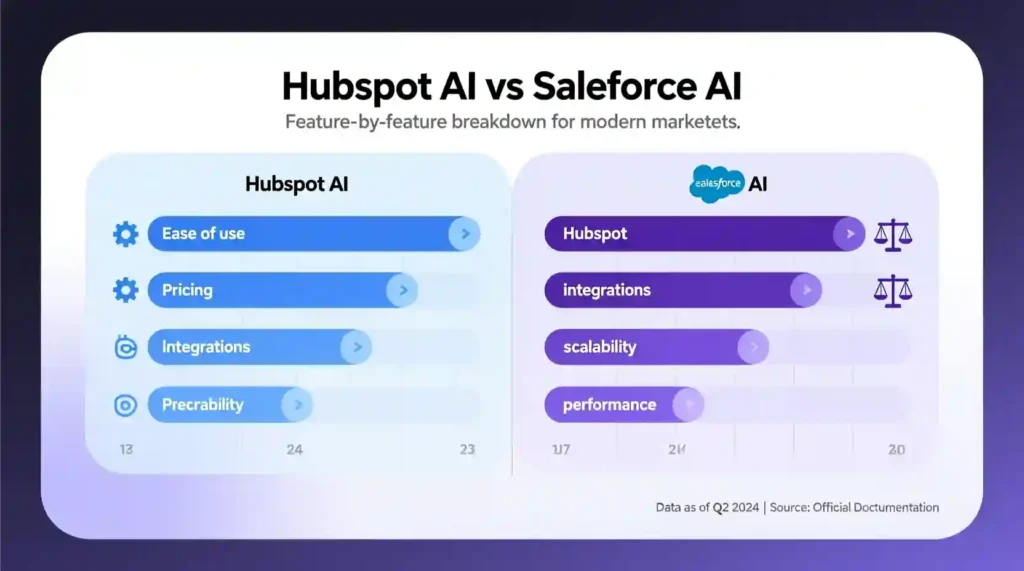
Comparison Table (Mobile-Friendly)
Here’s a quick look at how HubSpot AI and Salesforce AI stack up feature by feature.
| Feature | HubSpot AI | Salesforce |
| Ease of Use | ✅ Simple, intuitive | ❌ Steeper learning curve |
| Pricing | ✅ Freemium + affordable scaling | ❌ Higher cost, complex tiers |
| Support | ✅ 24/7 chat + active community | ✅ Premium service options |
| Integrations | ✅ Native + third-party apps | ✅ Extensive, enterprise focus |
| Scalability | ✅ Great for SMBs & startups | ✅ Enterprise-ready |
| Security | ✅ Strong compliance | ✅ Enterprise-grade protections |
| Performance | ✅ Fast onboarding, quick wins | ✅ Advanced analytics & insights |
| Best For | SMBs, startups, marketers | Large enterprises, power users |
| Verdict | Great for ease + marketing | Best for deep customization |
Performance Tests & User Experience
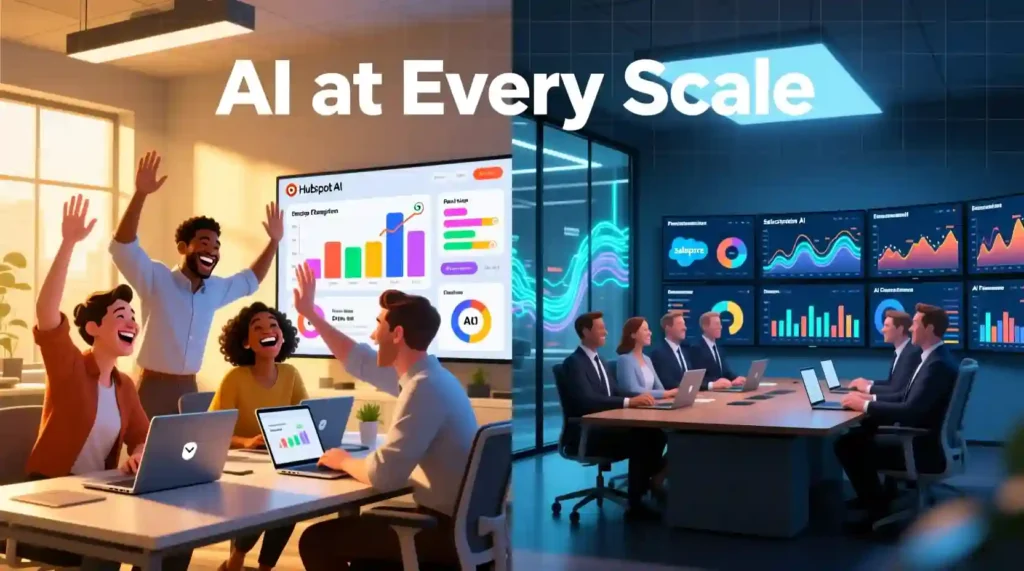
So, what’s it like actually using these tools in the wild?
HubSpot AI feels like a friendly co-pilot. When I ran email campaigns for a bootstrapped SaaS, HubSpot’s AI suggested the best times to send based on engagement. The results? A 17% bump in open rates — without me overthinking subject lines.
The UI is clean, colorful, and doesn’t bury you in jargon. Honestly, I’ve onboarded interns in a single afternoon. It’s that straightforward.
Salesforce AI, on the other hand, feels like flying a commercial jet. At first, the cockpit is overwhelming. But once you master it, you can fly higher than with any other CRM. The predictive lead scoring is next-level — I watched a sales team cut time-wasting cold calls by half because Einstein pointed them straight to the hot leads.
Quirks? HubSpot sometimes feels “too simple” when you want to customize workflows. Salesforce can feel bloated when all you want is to check lead health without drilling through 5 dashboards. Still, the surprise with Salesforce is how accurate its AI models get once you feed them enough data.
Pricing Analysis
Whenever I talk to founders or teams about picking a CRM, pricing is the first real pain point. And let’s be honest — both HubSpot and Salesforce know how to squeeze extra dollars out of you if you’re not careful.
HubSpot Pricing
HubSpot starts off like that friendly neighbor who hands you cookies — free CRM plan with contact management, pipelines, and basic AI-driven insights. As your business grows, you step into the paid tiers:
- Starter ($20–$30/month): great for solo entrepreneurs and small teams.
- Professional (around $800/month): more automation, deeper AI features.
- Enterprise ($3,600+/month): advanced reporting, predictive scoring, and big-team tools.
The catch? HubSpot sells a lot of “hubs” — marketing, sales, service. Each comes with its own add-ons. If you’re not careful, your $0 CRM can quickly balloon into $1,000+ a month.
Salesforce Pricing
Salesforce doesn’t play the freemium game. Their model is straight-up enterprise.
- Essentials ($25/user/month): basic CRM, no Einstein AI.
- Professional ($75/user/month): still limited AI.
- Enterprise ($150/user/month): Einstein AI becomes usable here.
- Unlimited ($300+/user/month): full AI suite, premium support, and all the bells and whistles.
Hidden costs? Oh yes. Custom integrations, consultants, admin training — these stack up fast. I’ve seen small teams drop $50K+ a year once everything is factored in.
Value for Money
Here’s where it gets interesting:
- For startups and SMBs, HubSpot offers insane value. You can start free, scale gradually, and only pay when features genuinely add value.
- For enterprises, Salesforce justifies the price with massive ROI potential. I’ve seen companies save entire sales teams’ worth of labor hours thanks to Einstein’s forecasting and automation.
In other words: HubSpot makes sense if your budget is tight. Salesforce makes sense if you’ve got the budget and need enterprise-grade AI muscle.
Pros & Cons
HubSpot AI: Strong and Weak Spots
Strengths:
- User-friendly (onboarding feels effortless)
- Tight marketing integration (SEO, email, ads, all in one)
- Transparent pricing tiers (at least at the start)
- AI features that feel helpful instead of overwhelming
Weaknesses:
- Customization is limited compared to Salesforce
- Advanced AI features locked in higher tiers
- Scaling costs rise quickly if you add multiple hubs
Salesforce AI: Pros and Cons
Strengths:
- Enterprise-grade AI (predictive analytics, advanced forecasts)
- Highly customizable (build workflows for any sales model)
- Huge ecosystem (AppExchange, integrations, partners)
- Strong brand trust in Fortune 500 companies
Weaknesses:
- Pricing is steep and complicated
- Learning curve is heavy (admins often required)
- Can feel bloated for small teams who just want basics
Use Case Scenarios
Let’s make this practical.
Who Should Pick HubSpot AI?
- Marketers: If your growth strategy is inbound-driven, HubSpot is gold. Its AI helps fine-tune campaigns, optimize content, and score leads without heavy setup.
- SMBs and Startups: If you’re under 50 employees and scaling fast, HubSpot’s freemium model keeps you nimble.
- Solo Entrepreneurs: Need CRM + email campaigns in one place? HubSpot makes you look bigger than you are without the headache.
I once worked with a boutique agency that went from spreadsheets to HubSpot overnight. Within two months, their conversion rate doubled because the AI suggested exactly when to nudge leads.
Who’s the Best Fit for Salesforce AI?
- Enterprises: If you’re running large sales teams across multiple geos, Salesforce is built for you.
- Power Users: If you want custom dashboards, predictive sales scoring, and AI-driven workflows, Salesforce delivers.
- Teams Needing Deep Customization: Think insurance, healthcare, or financial firms where compliance, automation, and integrations must be tailored.
One of my clients, a financial services company, used Einstein to predict churn risk. That single feature saved them hundreds of thousands in lost contracts.
Migration Headaches
Switching between the two? Painful.
- From HubSpot to Salesforce: Expect data migration challenges and retraining your team. But you’ll gain customization power.
- From Salesforce to HubSpot: Easier to manage, but you’ll feel like you left behind a Ferrari for a Honda.
Integration Perks and Pitfalls
- HubSpot: Integrates beautifully with marketing tools (Google Ads, LinkedIn Ads, WordPress). Pitfall? Less powerful for complex enterprise systems.
- Salesforce: Integrates with basically everything. Pitfall? Many integrations cost extra or need developer support.
Final Recommendation
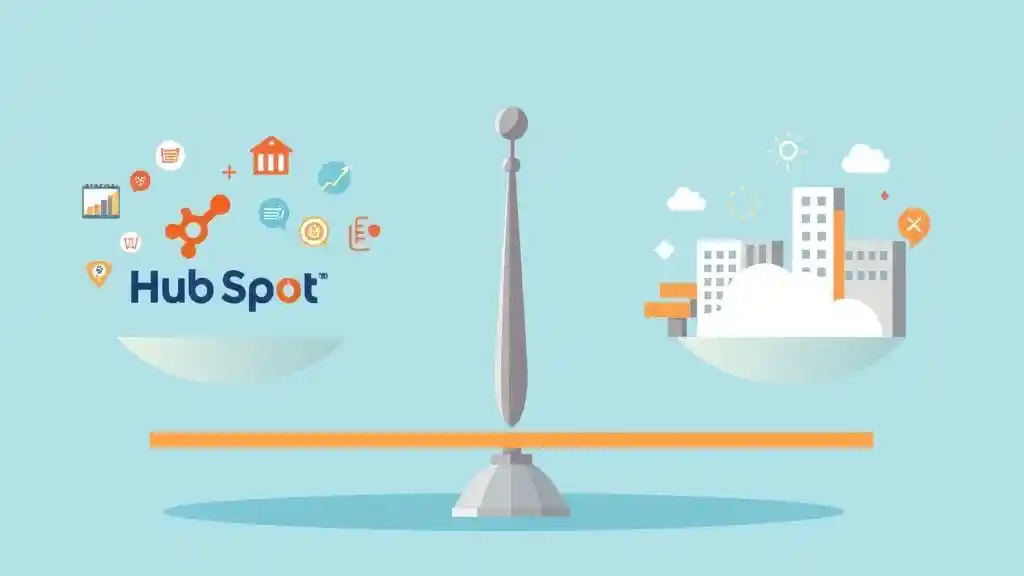
So, is there a clear winner in the battle of HubSpot vs Salesforce AI?
Honestly: it depends on your situation.
- Budget-conscious solo founders and SMBs → HubSpot AI is your best friend. It’s easy, affordable, and gives you quick wins.
- Heavy users and big enterprises → Salesforce AI is unmatched. It’s powerful, flexible, and will grow with you for years.
- Small teams with future enterprise ambitions → Start with HubSpot, then graduate to Salesforce when you can afford the complexity.
Future Trends to Watch
- HubSpot is doubling down on AI-assisted marketing campaigns and AI-powered content creation.
- Salesforce is leaning into predictive analytics and AI copilots that help sales reps act faster.
- Both are building deeper integrations with emerging tools like Slack, Notion, and AI workflow builders.
If you’re betting long-term, know this: CRM + AI isn’t just a tool anymore, it’s your sales strategy’s backbone.
Call to Action
Alright, I’ve shared my take — now it’s your turn.
👉 Have you tried HubSpot AI or Salesforce AI in real life? Did HubSpot feel too light, or did Salesforce’s complexity pay off in big wins? Drop your experiences in the comments.
👉 Share this guide with your team if you’re stuck choosing between the two.
👉 And if you’re hungry for more, check out my deep dives into CRM strategies, AI workflows, and marketing automation tools — because this space is moving fast, and staying ahead means knowing which AI is worth your time (and your budget).
Frequently Asked Questions About HubSpot vs Salesforce AI (CRM AI Comparison 2025)
1. What are the key differences between HubSpot AI and Salesforce Einstein AI capabilities?
The biggest difference I’ve felt is in complexity vs simplicity. HubSpot AI is like a helpful co-pilot that quietly boosts your marketing and sales flows. For example, their Breeze AI makes lead scoring and content generation feel effortless — I set it up for a client in an afternoon, and they were already seeing smarter email campaigns the same week.
Salesforce’s Einstein AI, on the other hand, is a powerhouse. It’s not something you master overnight, but once you do, the predictive analytics and automation are unmatched. I once watched Einstein flag a “long-shot” lead that everyone ignored, and that deal turned into a multi-million-dollar win.
2. How do HubSpot AI lead scoring and Salesforce AI sales forecasting tools compare?
HubSpot’s lead scoring is fast and lightweight. You can turn it on, and within days it’s showing you which prospects are “warm.” I used it with a small SaaS team — they immediately cut wasted calls and focused only on leads most likely to convert.
Salesforce’s forecasting is a different beast. It thrives on data. Once you feed it months (or years) of history, it gets scary-accurate. For one enterprise client, Einstein forecasting predicted a revenue dip before anyone noticed. That early warning gave them a chance to course-correct — saving them from a nasty quarterly surprise.
3. Which CRM AI is better for small business CRM AI solutions?
If you’re running a small business, I’d say HubSpot every time. Why? Because it’s not overwhelming. I’ve seen scrappy two-person teams pick it up in a single afternoon and actually enjoy using it. HubSpot’s free plan lets you test the waters without burning your budget, and the AI tools automate annoying stuff like email send times and follow-ups.
Salesforce can feel like you’re trying to drive a spaceship just to run a lemonade stand. It’s overkill unless you’re already scaling hard.
4. Is Salesforce AI suitable for enterprise AI CRM software needs?
Oh, absolutely. Salesforce was practically built for enterprises. I worked with a financial services client who had complex compliance needs and data across multiple regions. HubSpot just wasn’t enough — but Salesforce Einstein AI could handle predictive churn analysis, compliance automation, and multi-layer reporting. It was like giving their sales team a crystal ball.
So yes, if you’re enterprise-level, Salesforce is worth every penny (once you survive the setup headaches).
5. How do AI-powered CRM features improve marketing and sales?
This is where both shine. AI in CRMs basically saves you from guesswork. HubSpot’s AI helps marketers pick the right subject lines, perfect send times, and smarter ad targeting. I once tested their email send-time feature and saw open rates jump by 17% without changing anything else.
Salesforce’s AI goes deeper — it tells sales reps which deals are most likely to close and even suggests the next best action. I remember a sales rep telling me it felt like having a manager whispering the answers in her ear during calls.
6. Can you explain CRM AI pricing plans breakdown for HubSpot vs Salesforce?
HubSpot feels friendlier on the wallet at first. You can literally start free, then scale into $20/month starter plans. But here’s the catch: once you add marketing, sales, and service hubs together, that “cheap” CRM can creep into thousands per month.
Salesforce starts around $25/user/month, but the real AI features (Einstein) live in the higher tiers — often $150+ per user. Plus, you might need consultants or admins to manage it. One client joked that the hidden cost of Salesforce is “a full-time employee just to keep the lights on.”
7. What are common CRM migration challenges and tips when switching between HubSpot and Salesforce?
Switching CRMs is like moving houses — it’s never fun. When I helped a startup move from HubSpot to Salesforce, the biggest pain was mapping custom fields. Half the fields didn’t align 1:1, and the team had to relearn a totally new system.
My tip? Map everything carefully ahead of time, and don’t rush. Sometimes a hybrid period (running both CRMs while testing) can save a lot of stress. And always train your team — no AI is helpful if people don’t know how to use it.
8. How do integration options for HubSpot and Salesforce compare?
HubSpot integrates beautifully with marketing tools. Google Ads, LinkedIn, WordPress — it’s almost plug-and-play. When I connected HubSpot to a client’s Shopify store, it took less than an hour.
Salesforce’s integrations are more powerful, especially with enterprise systems like SAP or Adobe. But here’s the rub: some of them require developer time, and many cost extra. One client joked that “every time we added a new Salesforce integration, we also added a new invoice.”
9. What is the best AI CRM for startups in 2025?
Startups live and die by speed, and that’s why I recommend HubSpot AI. I’ve seen tiny teams look like polished sales machines just by setting up HubSpot’s free CRM and using the AI features for lead scoring and campaign optimization.
Salesforce is great, but unless you’ve got VC-level budgets and dedicated staff, it’s like buying a Formula 1 car to commute to work.
10. How does AI-driven customer support CRM feature in both platforms?
HubSpot has lightweight AI chatbots that handle basic queries — I saw one client cut support tickets in half because their bot could answer “Where’s my order?” instantly. It’s perfect for small and medium businesses who need fast answers without hiring big teams.
Salesforce’s Einstein AI is much more advanced. It can detect customer sentiment, guide agents live, and run multi-language support at scale. I once saw it in action for a global retail company — it auto-routed angry customers straight to senior reps before issues escalated. That’s enterprise-level customer support in motion.
